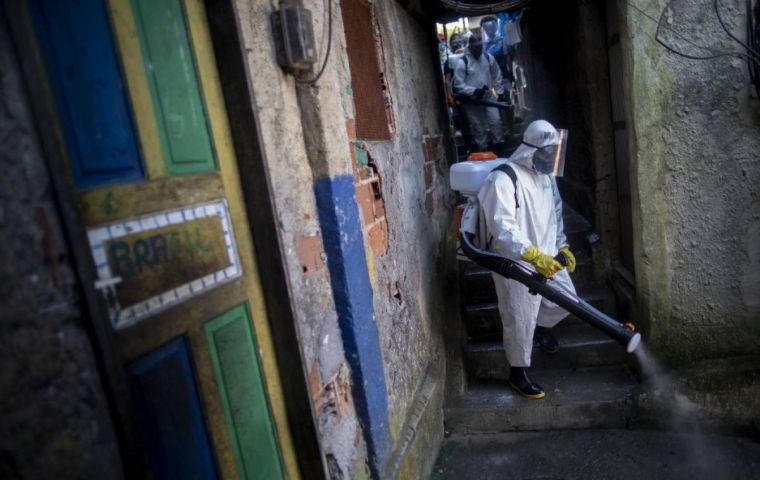MercoPress. South Atlantic News Agency
South America becomes a new epicenter of Covid-19 pandemic
 Dr. Mike Ryan, WHO’s emergencies expert, speaking earlier to a news conference, said: “In a sense South America has become a new epicenter for the disease.”
Dr. Mike Ryan, WHO’s emergencies expert, speaking earlier to a news conference, said: “In a sense South America has become a new epicenter for the disease.”  Dr. Mike Ryan, WHO’s emergencies expert, speaking earlier to a news conference, said: “In a sense South America has become a new epicenter for the disease.”
Dr. Mike Ryan, WHO’s emergencies expert, speaking earlier to a news conference, said: “In a sense South America has become a new epicenter for the disease.” South America has become “a new epicenter” of the deadly coronavirus pandemic, the World Health Organization (WHO) said on Friday, following a surge in the number of Covid-19 infections.
“In a sense, South America has become a new epicenter for the disease. We have seen many South American countries with increasing numbers of cases,” WHO emergencies director Mike Ryan told a virtual news conference.
“Clearly there is a concern across many of those countries, but clearly the most affected is Brazil at this point.”
The novel coronavirus death toll in Brazil surpassed 21,000 on Friday, and the country has now recorded more than 330,000 cases, with experts saying a lack of testing means the real figures are probably much higher.
With its curve of infections and deaths rising sharply, the country of 210 million ranks second in the world in terms of total cases, behind the United States and Russia. The death toll has doubled in just 11 days, according to official data.
“The majority of the cases are from the Sao Paulo region,” said Ryan. “But in terms of attack rates, the highest attack rates are actually in Amazonas: About 490 persons infected per 100,000 population, which is quite high,” he said of Brazil's vast northwestern state.
Brazil's health ministry has recommended using the anti-malaria drugs chloroquine and hydroxychloroquine to treat even mild cases of COVID-19 - treatments President Jair Bolsonaro has pushed for despite the lack of conclusive evidence of their effectiveness.
Ryan stressed that neither hydroxychloroquine nor chloroquine have been proven to be effective in the treatment of COVID-19 - or in prophylaxis against the disease.
The two drugs are among a handful involved in WHO-coordinated clinical trials to find effective treatments for the disease. Around 3,000 patients are taking part in the trials in 320 hospitals across 17 countries.
“Our current clinical and systematic reviews carried out by the Pan American Health Organization, and the current clinical evidence, does not support the widespread use of hydroxychloroquine for the treatment of COVID-19 - not until the trials are completed and we have clear results,” said Ryan.




Top Comments
Disclaimer & comment rules-

-

-

Read all commentsDo they mean S. America is the new epicentre, or Brazil is?
May 23rd, 2020 - 04:12 pm 0Pugol-H
May 24th, 2020 - 02:33 am 0I would imagine most the Latin American statistics are about as reliable as the transparency and honest governance in each of our nations.
Chile has registered over 57k cases, 544 deaths (of which 35 in the past 24 hours) and 22,504 recovered. There is very strong evidence there is a large percentage of asymtomatic cases.
We are living in a nightmare, but we just haven't awaken yet.
They think some 30%+ of cases here are asymptomatic, which meant by the time they realised it was here, it had already spread.
May 24th, 2020 - 04:01 pm 0They are now starting testing for anti-bodies, even though they are still not sure if you have immunity, it will tell us how far it has spread already.
Commenting for this story is now closed.
If you have a Facebook account, become a fan and comment on our Facebook Page!